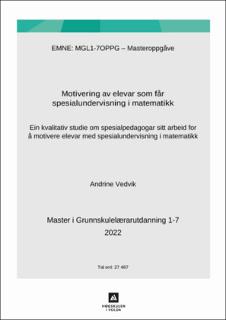| dc.contributor.advisor | Remøy, Anne-Kari | |
| dc.contributor.author | Vedvik, Andrine | |
| dc.coverage.spatial | Norway | en_US |
| dc.date.accessioned | 2022-08-23T07:33:57Z | |
| dc.date.available | 2022-08-23T07:33:57Z | |
| dc.date.issued | 2022 | |
| dc.identifier.uri | https://hdl.handle.net/11250/3012997 | |
| dc.description.abstract | This study discusses the work in motivating pupils who receive special education in mathematics. The purpose of the study is to take a closer look at how special educators in primary school work to motivate pupils who are struggling in mathematics, and who is entitled to special education in this subject. Based on this, I have asked the following research question: How does special educators motivate pupils who receive special education in mathematics?
In order to answer this question, I have chosen to use qualitative methods. Furthermore, based on the purpose of the study, I have chosen to use semi-structured interviews as the main method. To shed light on what actually happens in the special education, I have also chosen to use observation as a supplementary method. Four informants form the basis for the obtained empirical data.
The results from the study show that the special educators have a relatively similar perception of what motivation is and how one works with motivation in connection with pupils who receive special education in mathematics. All informants point out the importance of intrinsic motivation. At the same time everyone agrees that external motivation is a necessity to stimulate the internal motivation of the pupil. Another common feature is the informant’s agreement of their own crucial role in motivation of the pupils. Within this, the importance of a good teacher-pupil relation is highlighted.
The results also indicate that the special educators agree to which factors are important in the motivational work for pupils with special education in mathematics. Two of the most distinct common features are the importance of acknowledging the pupil's work and giving the pupils good mastery experiences. This is due to the fact that mathematics often is perceived as a difficult subject and that pupils who have difficulties in the subject often experience failure on a daily basis. For the same reason, the informants also place great emphasis on the importance of the visual, physical and tactile for pupils who are struggling in mathematics. These pupils have a greater need to visualize mathematics as mathematics is generally an abstract subject. The informants also point out that creative and committed special educators who are able to make mathematics exciting, fun and differentiating are important in the motivational work. | en_US |
| dc.description.abstract | Denne studien handlar om motivering av elevar som får spesialundervisning i matematikk. Føremålet med oppgåva er å sjå nærmare på korleis spesialpedagogar i barneskulen arbeider for å skape motivasjon for elevar som strevar i matematikk, og som har vedtak om spesialundervisning i dette faget. På bakgrunn av dette har eg følgjande problemstilling som utgangspunkt for studien: Korleis arbeider spesialpedagogen for å motivere elevar som får spesialundervisning i matematikk?
For å kunne svare på problemstillinga har eg valt å nytte kvalitative metodar. Vidare har eg basert på føremålet til studien valt å nytte meg av semi-strukturerte intervju som hovudmetode. For å belyse det som faktisk skjer i spesialundervisninga har eg også valt å nytte observasjon som ein supplerande metode. Fire informantar dannar grunnlaget for den innhenta empirien.
Funna frå studien viser at spesialpedagogane har relativt lik oppfatning av kva motivasjon er og korleis ein arbeider med motivasjon i tilknyting til elevar som får spesialundervisning i matematikk. Alle fire informantane påpeiker viktigheita av indre motivasjon. Samstundes er alle samde i at ytre motivasjon er heilt nødvendig for å stimulere den indre motivasjonen til eleven. Eit anna fellestrekk er spesialpedagogane sitt syn på at dei sjølve spelar ei stor rolle for eleven sin motivasjon. Her vert blant anna den gode lærar-elev relasjonen trekt fram som ein viktig faktor.
Funna viser også at spesialpedagogane er relativt samde knytt til kva faktorar som er viktige i motivasjonsarbeidet for elevar med spesialundervisning i matematikk. To av dei tydelegaste fellestrekka er viktigheita av å anerkjenne arbeidet til eleven og gje eleven gode meistringsopplevingar. Dette vert grunngjeve med at matematikk ofte vert oppfatta som eit vanskeleg fag og at elevar som har vanskar i faget gjerne opplev å mislykkast på dagleg basis. Av same grunn legg også informantane stor vekt på betydninga av det visuelle, fysiske og taktile for elevar som strevar i matematikk. Desse elevane har eit større behov for å få matematikken visualisert då matematikk generelt sett er eit abstrakt fag. Informantane peiker også på at kreative og engasjerte spesialpedagogar som evnar å gjere matematikkfaget kjekt og differensierande er viktig i motiveringsarbeidet | nn_NO |
| dc.language.iso | nno | |
| dc.publisher | Høgskulen i Volda | nn_NO |
| dc.subject.other | Mathematics Education | en_US |
| dc.subject.other | Mathematics Instruction | en_US |
| dc.subject.other | Special Education Teachers | en_US |
| dc.subject.other | Visualization | en_US |
| dc.subject.other | Creative Thinking | en_US |
| dc.subject.other | Primary School Students | en_US |
| dc.subject.other | Special Needs Students | en_US |
| dc.title | Motivering av elevar som får spesialundervisning i matematikk. Ein kvalitativ studie om spesialpedagogar sitt arbeid for å motivere elevar med spesialundervisning i matematikk | nn_NO |
| dc.title.alternative | Korleis arbeider spesialpedagogen for å motivere elevar som får spesialundervisning i matematikk? | nn_NO |
| dc.title.alternative | How does special educators motivate pupils who receive special education in mathematics? | en_US |
| dc.type | Master thesis | en_US |
| dc.rights.holder | Forfattaren | nn_NO |
| dc.source.pagenumber | 94 | en_US |
| dc.description.localcode | MGL1-7 | |
